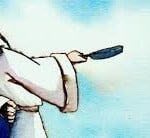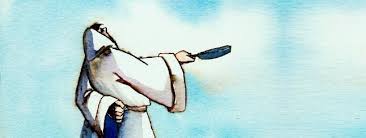
Rabbi Lord Sacks
Korach had a point. “You have gone too far! The whole community is holy, every one of them, and the LORD is with them. Why then do you set yourselves above the LORD’s assembly?” (Num. 16:3). At the heart of his challenge is the idea of equality. That surely is a Jewish idea. Was not Thomas Jefferson at his most biblical when he wrote, in the Declaration of Independence, that “We hold these truths to be self-evident, that all men are created equal”?
Of course Korach does not mean what he says. He claims to be opposed to the very institution of leadership, and at the same time he wants to be the leader. “All are equal, but some are more equal than others” is the seventh command in George Orwell’s Animal Farm, his critique of Stalinist Russia. But what if Korach had meant it? If he had been sincere?
There is, on the face of it, compelling logic to what he says. Did God not call on Israel to become “a kingdom of priests and a holy nation,” meaning a kingdom each of whose members is a priest, a nation all of whose citizens are holy? Why then should there be a cadre of priests and one High Priest?
Did not the military hero Gideon say, in the era of the judges, “”I will not rule over you, nor will my son rule over you. The LORD will rule over you” (Judges 8:23)? Why then should there be a single life-appointed Moses-type leader rather than what happened in the days of the judges, namely charismatic figures who led the people through a particular crisis and then went back to their previous anonymity, as Caleb and Pinchas did during the lifetime of Moses? Surely the people needed no other leader than God Himself?
Did not Samuel warn the people of the dangers of appointing a king? “He will take your sons and make them serve with his chariots and horses, and they will run in front of his chariots … He will take the best of your fields and vineyards and olive groves … When that day comes, you will cry out for relief from the king you have chosen, but the LORD will not answer you in that day” (1 Sam. 8:11-18). This is the biblical anticipation of Lord Acton’s famous remark that all power tends to corrupt. Why then give individuals the power Moses and Aaron in their different ways seemed to have?
The Midrash Tanhuma, quoted by Rashi, contains a brilliant commentary on Korach’s claim. It says that Korach gathered his co-conspirators and issued Moses a challenge in the form of a halakhic question:
He dressed them with cloaks made entirely of blue wool. They came and stood before Moses and asked him, “Does a cloak made entirely of blue wool require fringes [tzitzit], or is it exempt?” He replied, “It does require [fringes].” They began laughing at him [saying], “Is it possible that a cloak of another [colored] material, one string of blue wool exempts it [from the obligation of techeleth], and this one, which is made entirely of blue wool, should not exempt itself?” (Tanhuma, Korach 4; Rashi to Num. 16:1)
What makes this comment brilliant is that it does two things. First it establishes a connection between the episode of Korach and the immediately preceding passage, the law of tzitzit at the end of last week’s parsha. That is the superficial point. The deep one is that the Midrash deftly shows how Korach challenged the basis of Moses’ and Aaron’s leadership. The Israelites were “all holy; and God is among them.” They were like a robe, every thread of which is royal blue. And just as a blue robe does not need an additional fringe to make it bluer still, so a holy people does not need extra holy people like Moses and Aaron to make it holier still. The idea of a leadership hierarchy in “a kingdom of priests and a holy nation” is a contradiction in terms. Everyone is like a priest. Everyone is holy. Everyone is equal in dignity before God. Hierarchy has no place in such a nation.
What then did Korach get wrong? The answer is contained in the second half of his challenge: “Why then do you set yourselves above the LORD’s assembly?” Korach’s mistake was to see leadership in terms of status. A leader is one higher than the rest: the alpha male, the top dog, the controller, director, dominator, the one before whom people prostrate themselves, the ruler, the commander, the superior, the one to whom others defer. That is what leaders are in hierarchical societies. That is what Korach implied by saying that Aaron and Moses were “setting themselves above” the people.
But that is not what leadership is in the Torah, and we have had many hints of it already. Of Moses it says that “he was a very humble man, more humble than anyone else on the face of the earth” (Num. 12:3). Of Aaron and the priests, in their capacity as those who blessed the people, it says “So they will put My name on the Israelites, and I will bless them (Num. 6:27). In other words the priests were mere vehicles through which the divine force flowed. Neither priest nor prophet had personal power or authority. They were transmitters of a word not their own. The prophet spoke the word of God for this time. The priest spoke the word of God for all time. But neither was author of the word. That is why humility was not an accident of their personalities but of the essence of their role.
Even the slightest hint that they were exercising their own authority, speaking their own word or doing their own deed, immediately invalidated them. That, in fact, is what sealed the fate of Moses and Aaron later, when the people complained and they said, “Listen, you rebels, must we bring you water out of this rock?” (Num. 20:10). There are many interpretations of what went wrong on that occasion but one, undeniably, is that they attributed the action to themselves rather than God (see Hizkuni ad loc.).
Even a king in Jewish law – the office that comes closest to status – is commanded to be humble. He is to carry a Torah scroll with him and read it all the days of his life “so that he may learn to revere the LORD his God and follow carefully all the words of this law and these decrees and not consider himself better than his fellow Israelites” (Deut. 17:19-20; and see Maimonides, Laws of Kings, 2:6).
In Judaism leadership is not a matter of status but of function. A leader is not one who holds himself higher than those he or she leads. That, in Judaism, is a moral failing not a mark of stature. The absence of hierarchy does not mean the absence of leadership. An orchestra still needs a conductor. A play still needs a director. A team still needs a captain.
A leader need not be a better instrumentalist, actor or player than those he leads. His role is different. He must co-ordinate, give structure and shape to the enterprise, make sure that everyone is following the same script, travelling in the same direction, acting as an ensemble rather than a group of prima donnas. He has to have a vision and communicate it. At times he has to impose discipline. Without leadership even the most glittering array of talents produces, not music but noise. That is not unknown in Jewish life, then and now. “In those days there was no king in Israel. Everyone did what was right in his own eyes” (Judges 17:6, 21:25). That is what happens when there is no leadership.
The Torah, and Tanakh as a whole, has a marvellous, memorable way of putting this. Moses’ highest honour is that he is called eved Hashem, “the servant of God.” He is called this, once on his death (Deut. 34:5), and no less than eighteen times in Tanakh as a whole. The only other person given this title is Joshua, twice. In Judaism, a leader is a servant and to lead is to serve. Anything else is not leadership as Judaism understands it.
Note that we are all God’s servants. The Torah says so: “To Me the Israelites are servants; they are My servants whom I brought out of Egypt” (Lev 25:55). So it is not that Moses was a different kind of being than we are all called on to be. It is that he epitomised it to the utmost degree. The less there is of self in one who serves God, the more there is of God. Moses was the supreme exemplar of Rabbi Johanan’s principle, that “Where you find humility, there you find greatness.”
It is one of the sadder features of Judaism we tend to forget that many of the great ideas appropriated by others are in fact ours. So it is with “servant leadership,” the phrase and theory associated with Robert K. Greenleaf (1904-1990). Greenleaf himself derived it from a novel by Hermann Hesse with Buddhist undertones, and in fact the Jewish concept is different from his. Greenleaf held that the leader is the servant of those he leads. In Judaism a leader is the servant of God, not of the people; but neither is he their master. Only God is that. Nor is he above them: he and they are equal. He is simply their teacher, guide, advocate and defender. His task is to remind them endlessly of their vocation and inspire them to be true to it.
In Judaism leadership is not about popularity: “If a scholar is loved by the people of his town, it is not because he is gifted but because he fails to rebuke them in matters of heaven” (Ketubot 105b). Nor is a true leader eager for the job. Almost without exception the great leaders of Tanakh were reluctant to assume the mantle of leadership. Rabban Gamliel summed it up when he said to two sages he wanted to appoint to office: “Do you imagine I am offering you rulership? I am offering you avdut, the chance to serve” (Horayot 10a-b).
That, then, was Korach’s mistake. He thought leaders were those who set themselves above the congregation. He was right to say that has no place in Judaism. We are all called on to be God’s servants. Leadership is not about status but function. Without tzitzit, a blue robe is just a robe, not a holy garment. Without leadership, the Jewish people is just a people, an ethnic group, not a holy nation. And without reminders that we are a holy nation, who then will we become, and why?
